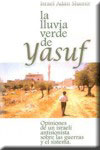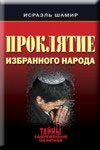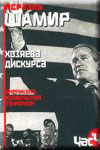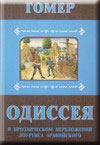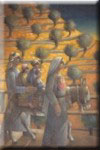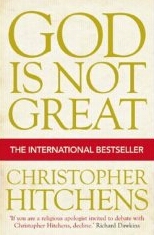
And Neither is Christopher Hitchens
Our British Catholic friend Anthony McCarthy
had sent us a scathing review of Christopher Hitchens’ book God is Not
Great, titled And Neither Is Christopher Hitchens. Once, Hitchens referred very nicely to my own (ISH) writing, and I
would like to be more grateful to him. But since then, he endorsed wars in the
Middle East , supported Bush, and not
surprisingly, denied God as well.
McCarthy’s review – and the site it appeared
on, CultureWars. com – are signs of independent Catholic opinion; independent of
Jews but still keeping within the Church.
They now published a mammoth book The Revolutionary Jewish
Spirit, by the revolutionary Catholic spirit E. Michael Jones, scooping two thousand years of
troublesome relations between the church and the Jews including near-victory of
past 40 years. Jones endeavors to connect Jewish strategies of permanent
revolution with the permanent Jewish rebellion against Christ (=Logos). This
timely book may help to regain the lost balance between Judaic and Christian
tendencies in the Western mind, as I wrote in an endorsement (a blurb) for the book. However, for Jones – and for
McCarthy – “revolutionary” is a swear word, while for me – rather a compliment.
They remain blind to the positive and truly Christian side of communism. Our
society needs to be improved, the financial predators must be de-toothed.
Nothing short of revolution is likely to do it.
But our Catholic friends – with
all my sympathy - are rather a timid lot. Robert Sungenis, a fellow-endorsee of
Jones, removed my writing from his site following a pro-Jewish censor’s remark.
Still, this is our role, to serve
as a bridge over troubled water, to help the Left and the Right to live and work
together for the common cause.
Israel Shamir
Christopher Hitchens, God is Not Great: How Religion Poisons Everything,
Reviewed by Anthony S. McCarthy
The atheist Christopher Hitchens discovered, relatively late in life, that he was Jewish. Not long after, he read a book by the Jewish writer Jacobo Timerman called Prisoner Without a Name, Cell Without a Number. Hitchens reflects on the account of Timerman’s torture by Argentinean goons:
As I read the account of his torture at the hands of the people who were later picked by Reagan and Casey to begin the training of the Contras, I was struck by one page in particular. An ideologue of the junta is speaking: “Argentina has three main enemies: Karl Marx, because he tried to destroy the Christian concept of society; Sigmund Freud, because he tried to destroy the Christian concept of the family; and Albert Einstein, because he tried to destroy the Christian concept of time and space.” Here was the foe in plain view. As that pure Austrian Ernst Fischer puts it so pungently in his memoir An Opposing Man: “The degree of a society’s culture can be measured against its attitude towards the Jews. All forms of anti-Semitism are evidence of a reversion to barbarism. Any system which persecutes the Jews, on whatever pretext, has forfeited all right to be regarded as progressive.” Here were all my adopted godfathers in plain view as well: the three great anchors of the modern, revolutionary intelligence. It was for this reason that, on the few occasions on which I had been asked if I were Jewish, I had been sad to say no, and even perhaps slightly jealous.1
This is an intriguing statement: why was Hitchens jealous? What did he think being Jewish meant? Clearly, something to do with being anti-Christian/ a revolutionary – but what was the connection? Was it cultural or religious? Or, more worryingly, was Hitchens making a racial point, and agreeing with “philosopher” Alfred Rosenberg that certain genes predispose a person to revolution?
Hitchens, in his latest book God is Not Great: How Religion Poisons Everything adds to this list of prophets and revolutionaries in a refreshingly candid manner. He tells us:
The concept of historical and dialectical materialism was not an absolute and it did not have any supernatural element but it did have its messianic element in the idea that an ultimate moment might arrive, and it most certainly had its martyrs and saints and doctrinaires and (after a while) its mutually excommunicating papacies. It also had its schisms and inquisitions and heresy hunts. I was a member of a dissident sect that admired Rosa Luxemburg and Leon Trotsky, and I can say definitely that we also had our prophets. Rosa Luxemburg seemed almost like a combination of Cassandra and Jeremiah…and the great-three volume biography of Leon Trotsky by Isaac Deutscher was actually entitled The Prophet…. As a young man Deutscher had trained for the rabbinate, and would have made a brilliant Talmudist – as would Trotsky (pp.151-152) .
Although Hitchens claims to have largely left such ideologies behind (of which more later) they give an insight into his essentially “religious” world-view (with its creeds, prophets and godfathers). In his admiration for Marx and Freud, Hitchens sides with the great debunkers of history. For Marx, the visible social and political structures are but a superstructure erected upon underlying economic forces. For Freud, conscious conduct is but a product of forces located in the unconscious. Both aim to explain dialectical conflicts via materialistic/ reductive strategies. And both allude to quasi-mystical ideas such as, in Marx’s case, the Laws of History.
Hitchens admires those who adopt materialist strategies and describes himself as a materialist (p.220). He buys into a particular worldview (what was called in an earlier age “naturalism”) which seeks to explain away or overturn traditional religion (and to some extent traditional scholastic, largely Aristotelian, metaphysics and the moral philosophy associated with it).
Of course, as E. Michael Jones’ shows in his latest book, The Jewish Revolutionary Spirit and its Impact on World History, at the heart of such worldviews is a rejection of Logos a) in the Person of Christ and b) in the form of the Natural Moral Law. What is constant amongst the characters named above is a very firm rejection of both a) and b). And yet their worldviews are, in fact, parasitic upon (though presumptive negations of) the idea of a created world imbued with inherent natural order—a world of natural kinds with their own teleology. Given what he tells us, it should come as no surprise that Hitchens is particularly disgusted by and rejects the idea of a personal God, let alone an incarnational one who acts with and is Logos.
Hitchens is very open in his rejectionism and quite clear on what he wants to achieve. In his excellent review of Hitchens’ book, Tom Piatak points out that, despite Hitchens’ weak protestations of a “live and let live” attitude towards religious practice (so long as it has no influence and no place in a supposedly neutral public square) he is on record as seeming to endorse its forcible suppression, telling PBS that “One of Lenin’s great achievements … is to create a secular Russia. The power of the Russian Orthodox Church, which was an absolute warren of backwardness of evil and superstition, is probably never going to recover from what he did to it.”2
So deep is Hitchens’ dislike for Logos that he almost seems to suggest that mass-murderers should be congratulated on their achievements in the frogmarching of the religious to those places Solzhenitsyn described so well.
This rejection of Logos is evident throughout Hitchens’ book, not least because, as a pupil of the Enlightenment, Hitchens is interested in (whether he knows it or not) what Pope Benedict XVI has called dehellenization. Indeed the Pope’s words on dehellenization are worth citing, for they sum up exactly Hitchens’ approach. The Pope says, of this attitude, that “First, only the kind of certainty resulting from the interplay of mathematical and empirical elements can be considered scientific. Anything that would claim to be science must be measured against this criterion. Hence the human sciences, such as history, psychology, sociology and philosophy, attempt to conform themselves to this canon of the scientific. A second point… is that by its very nature this method excludes the question of God, making it appear an unscientific or pre-scientific question. Consequently, we are faced with a reduction of the radius of science and reason, one which needs to be questioned.”3
II
Given this approach, it is worth, first of all, seeing just how “scientific” Hitchens’ work is with regard to the physical sciences, as well as historical facts. In the light of his reliability in these areas we should, perhaps, judge his more speculative writing. Tom Piatak has already listed a large number of factual errors made by Hitchens. I will outline some more here.
Hitchens, who constantly exalts the virtues of science, in discussing difficult questions of abortion and contraception makes the following claims. He begins by seeming to recognise the rights of the unborn, but soon tells us, in a prelude to his views on embryology, that there may be circumstances in which it is not desirable to carry a foetus to full term: “it is probably less miserable an outcome than the vast number of deformed or idiot children who would otherwise have been born, or stillborn, or whose brief lives would have been a torment to themselves and others” (p.221).4
Hitchens makes no important distinction between moral acts (aborting a foetus) and events of nature (miscarriage) . I had not realised that he took materialism to such extremes!
After delivering these judgements Hitchens inveighs against the “wild statement that sperm and eggs are all potential lives that must not be prevented from fusing….” No source is given for such a statement, and it would indeed be bizarre to claim that a sperm, say, was itself a potential human being—as opposed to having the potential to help produce a human being separate from itself. Hitchens then goes on to comment “On this basis, an intrauterine device that prevents the attachment of the egg to the wall of the uterus is a murder weapon and an ectopic pregnancy (the disastrous accident that causes the egg to begin growing inside the Fallopian tube) is a human life instead of an already doomed egg…” (p. 222). Had Hitchens read even the most basic textbook of human embryology, or reflected on the second word of the phrase “ectopic pregnancy,” he might have acknowledged that what he calls an “egg” is not a gamete of the woman, but a human embryo: a human being at the earliest stage of his/her life, who is already affecting the woman in all sorts of physical ways. Had he acknowledged the scientific facts he would at least be in a position, potentially, to make a sensible moral judgement. But, as well as attempting to justify the taking of young human life (which he ‘scientifically’ decides is ‘not worth living’ in some cases) he is lamentably careless on the question of when such life actually begins. Given that Hitchens accepts that a human being is not a pure spirit, but a living human animal, it should be clear that the origin of the human being can be traced to the origin of the human animal – the fusion of the father’s and mother’s gametes (or more rarely, cloning or a similar phenomenon). And human beings, as Hitchens elsewhere seems to admit, have human interests and rights.
Of course, all of these issues are bound up with sex. Hitchens’ attitude to this subject seems to be partially summed up in his statement that “Sexual innocence, which can be charming in the young, if it is needlessly protracted is positively corrosive and repulsive in the mature adult.” (p. 227). So, all those celibate saints and others (including some whom Hitchens professes to admire) are in some sense “repulsive” merely for having chosen this particular way of life! It’s a view, I suppose, – though again, little argument is provided to show that this feeling of repulsion is rationally desirable.
As a good Freudian, Hitchens sees the problem in terms of repression. There is much to be said about this view, but I will restrict myself for now to what Hitchens has to say about AIDS. Leaving aside the much-debated issue of holes in condoms – which is not quite as simple as Hitchens believes – a much more serious issue is the documented increase in cases of AIDS and other sexually transmitted infections (STDs) as a result of condom failure and increased risk-taking.
Behavior-based strategies or risk-avoidance campaigns have been welcomed by an increasing number of researchers in this highly politicised field. Perhaps the best known primary-behaviour- change strategy is the ABC campaign. The acronym stands for: Abstinence, Be Faithful, otherwise use a Condom. Here, in contrast to aggressive condom promotion, the stress is on encouraging people to change their behaviour in ways that will reduce the likelihood of HIV (and other STD) transmission. Uganda is frequently cited as a country which adopted an ABC campaign and subsequently experienced a remarkable 31 percent decrease in HIV incidence, with condoms playing only a minor role.5 As one study argued “the promotion of condoms at an early stage proved to be counter-productive in Botswana, whereas the lack of condom promotion during the 1980s and early 1990s contributed to the relative success of behaviour change strategies in Uganda.”6
So much for Hitchens’ attention to scientific facts. So keen is he to spread the AIDS blood-libel—as it might be termed—that he simply presumes, without investigating the data, that countless AIDS deaths are caused by Church teaching . He presumes, in his materialist way, that sexual behaviour is irresistible for people infected with HIV, so that it is better they risk their lives with condoms than abstain (which is, in any case, ‘repugnant’). Hitchens, a promoter of the sexual revolution which helps cause these problems in the first place, also fails to mention that the Church is at the forefront of supporting AIDS sufferers, providing a quarter of all AIDS healthcare worldwide.7
In Cardinal Alfonso Lopez Trujillo’s words, which deserve a better hearing than they have often received, the Church’s members “care not only for the individuals but also for their families, in the most holistic manner, respecting the dignity of the human person and the family through the proper use of sex and promoting the life-long commitment of spouses.” 8 If Hitchens finds this perspective repulsive, one wonders why this might be so.
III
Still on the subject of attention to facts, let us examine Hitchens’ forays into history. Predictably Hitchens brings up the case of Pius XII and the Nazis. As so much has been written about this, I will not devote much time to the topic, except to note that, incredibly, Hitchens completely ignores the thousands of Jews rescued by Pius XII and does not appear to have read the examinations of this period by Father Pierre Blet, Rabbi David Dalin, Ronald Rychlak, Michael Burleigh, Martin Gilbert or others. Instead he only refers to the thoroughly-refuted book by John Cornwell – Hitler’s Pope – a book so fraudulent that even its cover photo constitutes a gross deception. As Cornwell, who is not a historian, has seen his work so discredited, it is laughable that Hitchens continues to take it at face value. Here is Burleigh, a real historian and arguably one of the greatest living historians of the Third Reich, on the issue:
Even when Catholic clergy were themselves implicated in atrocities, as in Croatia or Slovakia , it is important to recall that the Vatican had limited powers to control even its own priests in situations where their nationalist passions were ablaze. As Pius’s own secretary of state said: ‘It is a great misfortune that the president of Slovakia is a priest. Everyone knows that the Holy See cannot bring Hitler to heel. But who will understand that we cannot even control a priest?
Since the 18th century the papacy has sought to be an international moral arbiter. All popes have to balance leading an institution whose purpose is to save souls with a general role as Christ’s vicar on earth. Speaking out for humanity may jeopardise the first role, while specific appeals on behalf of persecuted groups may make the position of others worse.
Too forthright a protest would lead the Nazis to include hitherto exempt categories of people in their murderous plans, as they did in Holland where, following just such a protest by the clergy, 80 percent of Jews perished. Apart from not wishing to jeopardise the church’s international relief operations, Pius also had to think about Jews secreted in churches and monasteries throughout occupied Europe . These included 3,000 Jews hidden in his own summer palace and others in the spy-riddled Vatican .
Since nothing would have stopped the Nazis in fulfilling their exterminatory mission, should the Pope have encouraged them in their quest by issuing a ringing protest? After 1945 many prominent Jews… expressed their gratitude to Pius XII for the church’s help in rescuing hundreds of thousands of their co-religionists. In 1955 the Israeli Philharmonic Orchestra was sent to Rome to give a Beethoven concert in Pius XII’s honour… Hitler’s Pope was really a friend of the Jews.9
One might also note that Catholics in Germany voted against the Nazis, as Erik von Keuhnelt-Leddihn demonstrated in his Liberty and Equality.10 We might remember Maximilian Kolbe (whom Hitchens sneeringly alludes to) or Edith Stein (whom he doesn’t mention). Or we might think of Dachau , which was so full of sympathetic Catholic clergy that it evolved its own liturgical life, and even a seminary where one priest was ordained.
Hitchens, in discussing Hitler, states that the Catholic Church shared two important principles with the Nazis, “anti-Semitism and anti-Communism.” Does he mean that the Church discriminated ‘racially’ against Jews? By not defining the term anti-Semitism, Hitchens uses it as a bludgeon against his ideological opponents (and remember, for Hitchens, anti-Semitism is worse than other forms of racism). However, a racial doctrine differs markedly from a religious position that does not advocate harming the dignity of any Jewish person and strongly condemns such practices. One might just as well call Hitchens a racist for opposing Christianity – even to the extent of praising, though with reservations, Lenin’s anti-Christian achievements. Perhaps he would prefer Hitler’s less persecutional (and certainly non-racist) attitude to Christians. As Richard Overy recalls: “Religion was persecuted less systematically and violently in Germany because Hitler expected ‘the end of the disease of Christianity’ to come about by itself once its falsehoods were self-evident… . Both Stalin and Hitler wanted a neutered religion, subservient to the state, while the slow programme of scientific revelation destroyed the foundation of religious myth.”11
Such reflections show the absurdity of Hitchens’ attempts to lump Nazis and Catholics together. He tells us “one can perhaps accept that 25 percent of the SS were practising Catholics…” (p. 240). Does he not know that every SS man had a membership file, where ‘religious affiliation’ had to be filled in? In Himmler’s correspondence there are numerous letters in which individual SS leaders were questioned on this point (a selection of Himmler letters was edited by Helmut Heiber). It transpires that the SS required of every member that they renounce the Christian faith before joining. That means that the major perpetrators of the Holocaust were effectively not Christians any more. Hitchens may perhaps be excused for not knowing this, as even many historians of Nazism have been silent on the subject.
In relation to Bolshevism, Hitchens does note that killing priests and nuns should not be excused. However, he goes on to add that “the long association of religion with corrupt secular power has meant that most nations have to go through at least one anticlerical phase, from Henry VIII through Cromwell to the French Revolution…the church in Russia was the protector of serfdom and the author of anti-Jewish pogroms…” (p. 244). The references here are to incredibly bloody and unpopular revolutions which in every case left their host countries far worse off in almost every way (once the enormous amounts of blood had been cleared away to make room for the police states that followed the “anticlerical phase” that most nations “have to go through”). After all, those laws of history can’t be halted by religious peasants, can they? And, of course, no mention of the extreme bloodlust of the secular French Revolution which, according to Simon Schama,12 was central to the whole enterprise.
All of these distortions merely cover over the fact that rebellion against Logos hasn’t failed to massacre and desecrate and trample upon human life wherever it takes up its wretched cause. As for the point that totalitarian regimes share with religion certain basic features, even a cursory look at pre-revolutionary societies and post-revolutionary should confirm the radical differences between the two.
IV
Both Nazis and communists have had a great regard for Darwin ’s theory of evolution and have tried to justify their ideologies (and murderous activities) by vague allusions to it. Hitchens, unsurprisingly, thinks Darwin gives him a weapon to reveal the absurdity of various religious claims. In attempting to do this he offers a potted version of what biologist Richard Dawkins has been writing about for years. Unfortunately, Dawkins makes basic errors in his account of evolution, such as apparently assuming that fundamental particles are so simple as to need no explanation. As Stanley Jaki has put it: “What Dawkins tries to achieve by this claim is that there is no need to invoke a creator. Actually he loses hold on the universe itself which is anything but ‘simple,’ that is, non-specific.” 13
Let us accept that there are three main elements to Darwins ’s theory: a) the claim that new species originated from older ones, b) the claim that the emergence of the new species is due primarily to Natural Selection, c) the claim that, following the above, structures that are apparently purposive arise through non-purposive mechanisms. The tendency of Hitchens to relapse into the kind of teleological language that this theory is supposed to have made redundant is unfortunate. It is also unfortunate that Hitchens does not delve at all into these — surely central — areas. Hitchens the materialist effectively takes Darwinism as a given, assuming that all living things arose from inorganic matter. Even the biological materialist J. B. S. Haldane saw what might follow from such a theory: “If my mental processes are determined wholly by the motions of atoms in my brain, I have no reason to suppose that my beliefs are true. They may be sound chemically, but that does not make them sound logically. And hence I have no reason for supposing my brain to be composed of atoms.”14
But leaving this aside, Hitchens has nothing to say about the following problems. An eye sees (or is an organ for seeing) because it has a particular structure. Darwinism is supposed to explain how an eye got the determinate structure it got, and if life is defined via natural selection surely we should be able to find an evolutionary explanation for its origin. Such a theory cannot assume as a starting point a determinate nature. So it must assume a somewhat indeterminate nature (hence Dawkins’ concern with the “simple”). If this indeterminate nature is merely a capacity for everything (or nothing?) from where does it derive the determination which kicks off the evolutionary process? Obviously not from itself, but presumably from something which determines itself and so acts with purpose and intention.15
The issue is never alluded to by Hitchens, nor are the well-known problems of the evolutionary interpretation of homology, the fossil record etc.16 Given the weakness of the case presented by Hitchens it is not surprising that he devotes much time and space to a distracting attack on the “Argument from Design,” an argument that, in some versions, seems to posit a Divine Creator via an empirical proof of special creation.
The cosmological argument is a metaphysical argument which, to be fair, Hitchens makes a tiny bit of room for and also avoids the worst attempt at answering.17 Given the weakness of the ontological argument (at least as presented by St Anselm and refuted by St Thomas Aquinas), Hitchens seeks to refute the cosmological argument by reducing it to the former. As Hitchens has it, Kant “overthrew the cosmological proof of god – which suggested that one’s own existence must posit another necessary existence – by saying that it only restated the ontological argument…And he undid the ontological argument by challenging the simpleminded notion that if god can be conceived as an idea, or stated as a predicate, he must therefore possess the quality of existence” (p. 265).
Firstly, such an argument would not deal with all of Aquinas’ Five Ways , each of which claims to be a proof of the existence of God (they are not all substantially the same). Secondly, the cosmological argument only seeks to prove an attribute of God – his necessary being – not what Kant assumes, i.e. a being whose very existence is logically included in the concept of its essence. By arriving independently at God’s existence as a necessary being Aquinas then goes on to show that a necessary being which exists must, by logical deduction, be a being in which essence and existence are identical.
I appreciate that Hitchens is not a philosopher, but suggest that a simple reading of some introductory texts might disabuse him of some of the ideas he is happy to spread to thousands around the world — ideas that may have quite an impact on people’s lives.
V
As suggested at the beginning, Hitchens seems to hold a particular dislike for a personal God. As a secular Jew, he is contemptuous of the beliefs of religious Jews and of much of the Old Testament. He is much more lenient when it comes to Deism. The idea that a necessary and perfect being lacks the perfections of Intelligence and Will that define a Person and are present in all the persons this entity has made is perplexing, but discussions of this type will have to wait.
Hitchens cites all sorts of passages from the Old Testament designed to show that religion is barbaric and God cruel. For a professor who teaches and knows about English literature, Hitchens has a tin ear when it comes to Old Testament stories. When describing the story of Abraham and Isaac he can only see attempted murder. He fails to realise that the Giver of life has every right to end life (all of us die, after all) and take the person who has died to Himself. This does not justify murder, for no man may take it upon himself to murder a human being made in the image of God. But that God might act through a human agent to achieve His aim in special circumstances does not make God evil or capricious, any more than the fact that humans are mortal as regards their earthly life.
Isaac is not killed (which for Hitchens doesn’t seem to count for much), and human sacrifice was never practised or sanctioned by the Church – indeed it was condemned in vehement terms (though practised frequently by pagans). It’s a bit rich of Hitchens, who endorses the modern “sacrifice” of abortion and indeed of people like Terri Schiavo, to condemn the non-fatal sacrifice of Isaac!
Of course, the story of Abraham and Isaac prefigures the ultimate sacrifice of Christ at Calvary . Here is what Hitchens makes of the whole story of the Passion:
If Christian orthodoxy is valid, then Judaism is futile: a pointless hanging-about for the arrival of the Messiah, who has already shown up. Why not just admit this…. If the Jewish leadership had any guts, it would turn on those who taunt it with “Christ-killing” and say, “Yeah, all right, since you keep mentioning it, we did you a favour. Judas too. Where would your faith be without us?”18
Such reasoning might, of course, justify the Holocaust too. But it does give us an insight into that deep aversion to Christ which Hitchens shares with more religious opponents of Christianity. Hitchens, like Rousseau, seems to regard the doctrine of Original Sin as a blasphemy. What happened at Calvary (and whether or not you believe in God, it did happen, according to respectable historians of the period) is inexorably bound up with Original Sin. That through Adam’s faithlessness he became incapable of handing down certain gifts is in no way absurd (or “unfair”). And that there are, at least, certain extrinsic impairments of our natural energies and faculties is surely attested to by everyday experience.
According to Christian doctrine, Christ the God-man chose to suffer and to die in order to atone for our sins. On one view of this, only an infinite being could atone for the infinite offence that human sin gives to the Creator. Whether one believes this or not (and there is certainly much more to say on the subject), it is not obviously illogical or absurd, once one accepts the idea of a personal God.
For Hitchens, though, “Once again we have a father demonstrating love by subjecting a son to death by torture, but this time the father… is god, and he is trying to impress humans…. I am told of a human sacrifice that took place two thousand years ago…. In consequence of this murder, my own manifold sins are forgiven me, and I may hope to enjoy everlasting life” (p. 209).
As Hitchens himself appears to acknowledge, it is my sin here and now that makes me in part responsible for what is a timeless event (Christ is God, remember, and is thus uniquely capable of representing mankind). His sacrifice possesses an infinite value because he is Logos, and it is made out of love for me because there is nothing I would be capable of doing “naturally” (i.e. according to my fallen nature) that could adequately atone for my sins. However, what this does not mean is that I may sin – for the sacrifice atones in that it gives me the possibility of overcoming sin, but that is a radical choice that I must make and keep making throughout my life. He died for all, but not all will choose His way and the way of the moral law.
For someone who has written about religion for a long time and has now produced a best-selling book about it, one might not unreasonably have hoped that Hitchens would have read just a little more theology.
Elsewhere Hitchens tiresomely resurrects some old biblical chestnuts. To give just one example, he writes “Saint Matthew… [based] everything on a verse or two from the prophet Isaiah which told King Ahaz... that ‘the Lord shall give you a sign; a virgin will conceive and bear a son.’ ” Hitchens adds “we know that the word translated as ‘virgin’, namely almah, means only ‘young woman’” (p. 115).
Fine, except that the word can mean either, and it would hardly be a miraculous sign for a young woman to give birth!
Hitchens’ faulty understanding of the Old Testament extends to his repeated claim in debates that, unlike the New, it never alludes to Hell. Perhaps he should look at, say, Judith 16.20-21 or Isaiah 66.24.
VI
As if all this weren’t depressing enough, Hitchens seems to assume (without realising it) that virtue is simply beyond the grasp of human beings. He states, just after referring to Catholics, that: “The essential principle of totalitarianism is to make laws that are impossible to obey…. Human are not so constituted to care for others as much as themselves…. Urging humans to be superhumans… is the urging of terrible self-abasement at their repeated and inevitable failure to keep the rules” (pp. 212-213).
The concept of grace and the lives of the saints seem to completely elude Hitchens. While perceptive about man’s fallen state, Hitchens fails to learn from those who did open themselves up to God’s will and are generally regarded as the greatest humans that ever lived. Hitchens may sneer at a Saint Francis, but didn’t he actually show us how it is possible for a human to be, in a sense, superhuman, precisely because he acted upon graces that went beyond Hitchens’ naturalism?
And it is this refusal to acknowledge that if there is a personal God, there is such a thing as grace given by him that makes Hitchens’ efforts hopeless. Even if one doesn’t believe, one should at least be able to see the logic of the Christian position or even, if one opens one’s eyes, the special virtues of the Saints. Hitchens repeatedly makes the point that people knew about moral precepts before Sinai. He is right; they had an idea of the natural moral law. Do the religious deny this? The point about the Chosen People and Sinai is that they were given gifts to make the following of that law prima facie easier. And the graces that derive from Calvary are unimaginably greater gifts, which we refuse because we prefer vice. But they are, nonetheless, here, and we can see these graces at work if we choose to.
One person who many think was particularly receptive to God’s graces was Mother Teresa. Hitchens has already attacked her in a tastefully titled book.19 Here he repeats the story he told with regard to the supposed miracle that writer Malcolm Muggeridge said he witnessed, in relation to Mother Teresa’s Home of the Dying, during the production of the film Something Beautiful for God. Muggeridge claimed that in the processed film of the visit, the part taken inside the Home was “bathed in a particularly beautiful soft light, whereas the part taken outside was rather dim and confused…” (p. 145). The point was that inside the Home was dimly lit whereas it was sunny outside, which was also filmed. In Muggeridge’s words. “I am absolutely convinced that the technically unaccountable light is, in fact, the Kindly Light that Cardinal Newman refers to in his well-known exquisite hymn…This is precisely what miracles are for – to reveal the inner reality of God’s outward creation” (pp. 145-146).
Hitchens, in view of these claims, quotes the cameraman of the film, Ken MacMillan:
we had just taken delivery at the BBC of some new film made by Kodak which we hadn’t had time to test…. And when we got back several weeks later…we are sitting in the rushes theatre at Ealing Studios and eventually up come the shots of the House of the Dying. And it was surprising. You could see every detail. And I said, “That’s amazing. That’s extraordinary.” And I was going to go on to say, you know, three cheers for Kodak. I didn’t get a chance to say that though, because Malcolm, sitting in the front row, spun round and said: “It’s divine light! It’s Mother Teresa... ” (p. 146).
It’s a good story. It’s also just a part of the story — the only part that interested Hitchens. The well-known English journalist Richard Ingrams, in his engrossing biography of Muggeridge,20 notes that Macmillan further stated that when he used the same film in similar light conditions (to Mother Teresa’s House of the Dying) some time afterwards in a Cairo nightclub the results were unusable. There was also an incident on a subsequent filming by MacMillan in the BBC’s In the Steps of St. Paul. Alec Vidler and Malcolm Muggeridge were set up to be walking along a lonely road discussing St. Paul ’s conversion on the road to Dasmascus. When this other Ken MacMillan film was processed Peter Chafer (director of Something Beautiful for God) noticed that at one point the two figures in the shimmering heat were joined by a third, who seemed to walk with them before disappearing.
Hitchens has read Ingrams’ biography and has been told, personally, by Ingrams that he ought to at least interview Chafer, a level-headed non-believer, about these events. Apparently when it comes to allegations of the miraculous, proper investigation is not favoured by this particular non-believer.
VII
Talk of miracles and grace leads us to contemplate a question that Hitchens has been asking in debates: Can you think of a single good act done by a religious person that could not also have been done by a non-religious person?
An obvious answer to the question might be – to exorcise a demon, or to offer up an atoning sacrifice to God for the sins of oneself or others. Hitchens will, of course, reject such an answer because it appeals to the supernatural. Well, surprise, surprise! It is merely tautologous to hold that a non-religious person can achieve a natural good, as can a religious person. For both operate at the natural level! Moreover, that a religious person, with the aid of special graces, may find it easier to achieve certain natural goods is not a proposition discussed by Hitchens.
Perhaps Hitchens’ views here affect (or are affected by) his views on Church teaching on sexual ethics. Hitchens declaims “One could write an entire book that was devoted only to the grotesque history of religion and sex, and to holy dread of the procreative act and its associated impulses and necessities…” (p. 215).21
And I thought the Catholic Church was often criticised precisely because it was one of the few institutions that insists that a truly loving sexual act must be of a procreative type! Perhaps Hitchens should take a look at Humanae Vitae. Whilst devoting quite a few pages to sex (and implying that the Church is obsessed with the subject) Hitchens, towards the end of the book, writes: “the divorce between the sexual life and fear, and the sexual life and disease, and the sexual life and tyranny, can now at last be attempted” (p. 283). As I write these words in London , one of the more secular cities in the world, the STD rate skyrockets after years of condom-promotion, sexualized advertising, and a general denigration of the institution of marriage, which is love and the life-long commitment structured around a reverence for the marital union and its appropriate physical expression. Hitchens’ dream has been tried and has failed.
It’s a pattern with Hitchens’ dreams. In reflecting on another failed experiment he once went along with Hitchens tells us: “The concept of historical and dialectical materialism was not an absolute and it did not have any supernatural element, but it did have its messianic element in the idea that an ultimate moment might arrive… but the fact had to be faced: there was no longer any guide to the future…. The very concept of a total solution has led to the most appalling human sacrifices, and to the invention of excuses for them” (pp. 151-153).
With no hint of irony, this nihilistic revolutionary “converted” to the idea of an endless “war on terror” to wipe out fundamentalism, fascism, anti-Americanism, leftism, anti-Semitism etc. at the cost of countless innocent lives, usually those of the poor. He pursues his messianic vision, Barrabas-like in his fervour, Caiaphas-like in his seeming indifference to the victims of the policies he supports.
Hitchens the “revolutionary” is proud of his heritage. Perhaps he concurs with the British journalist Melanie Phillips, who interestingly sees the neoconservative view of the world as “a demonstrably Jewish view. Christians see man as a fallen being, inherently sinful. The neocons have the Jewish view that mankind has a capacity for both good and ill. Christians believe humanity is redeemed through Christ on the cross; the neocon approach is founded on the belief that individuals have to redeem themselves…. Neocons believe in taking the world as it is, but encouraging the good and discouraging the bad. It is this impulse to tikkun olam that gives the neocons the optimism that so distresses old-style paleo-conservatives… [T]he neocons belief that good can prevail over evil…lay behind the wars against Afghanistan and Iraq .”22
Cognisant of these messianic tendencies in Hitchens, the enlightened Jew Norman Finkelstein notes that: “contemptuous of ‘transient polls of opinion,’ he’s still a Trotskyist at heart, guiding the benighted masses to the Promised Land, if through endless wars and safely from the rear.”23
If only Hitchens — and all of us — were to take our bearings more from Calvary and less from self-assertive political factions, perhaps endless wars in ourselves and outside ourselves might be avoided. At any rate, if I were Hitchens I would not, as he does, take the injunction to “Know yourself” as one of the “consolations of philosophy” (p. 283).24
Anthony S. McCarthy can be contacted at asdmccarthy@ hotmail.com
This review will be published in the July/August, 2008 issue of Culture Wars.
Notes
1 On Not Knowing the Half of It: Homage to Telegraphist Jacobs, collected in Prepared for the Worst (Hogarth Press 1988) pp.345-357 (Italics added). Christopher' s brother Peter, a Protestant and counter-revolutiona ry, appears to assign no great significance to his Jewish heritage.
2 http://www.takimag. com/site/ article/hitchens _hubris/ Hitchens generously allow that “Religious faith is, precisely because we are still-evolving creatures, ineradicable… For this reason, I would not prohibit it even if I thought I could.” (p. 12). For “this reason”? Does he mean that if it were not for this reason he would seek to prohibit religion?
3 Faith, Reason and the University: Memories and Reflections, Meeting with the Representatives of Science, University of Regensburg , 12th September 2006.
4 It is clear from the text that Hitchens also supports deliberate abortion in these circumstances – presumably as a form of (non-voluntary) euthanasia. Hitchens, perhaps unsurprisingly, was a major cheerleader for the intentional killing by omission of Terri Schiavo (whom Hitchens claimed was “dead” despite all evidence). For Hitchens on Schiavo see http://www.slate. com/id/2115860/. For some actual medical information on the case a good place to start is http://www.national review.com/ comment/johansen 200603310740. asp .
5 Mbulaiteye SM, Mahe C, Whitworth JA, et al. Declining HIV-1 incidence and associated prevalence over 10 years in a rural population in SW Uganda: a cohort study; Lancet; 2002; 360:41-46. According to a recent study by two experts in the field: “the government [from the beginning] communicated a clear warning and prevention recommendation: AIDS or ‘slim’ was fatal and required immediate population responses based on ‘zero-grazing’ , that is, faithfulness to one partner. Condoms were a minor component of the original strategy” (my emphasis). Low-Beer D, Stoneburner RL. Population-level HIV declines and behavioural risk avoidance in Uganda : Science; 2004; 304: 714-718.
6 Allen T. and Heald S. HIV/AIDS Policy in Africa, What has worked in Uganda and what has failed in Botswana ?, Journal of International Development; 2004;16;1141- 1154 . Further, a 2003 UNAIDS review of the effectiveness of condom campaigns concluded: “…the public health benefit of condom promotion in settings with widespread heterosexual transmission remains unclear. In countries like Uganda that have curbed generalized epidemics, reducing numbers of partners appears to have been more important than condoms. Other countries continue with high HIV transmission despite high condom use”. http://www.usp. br/nepaids/ condom.pdf p2. The precise impact of C (condoms) on the efficacy of ABC campaigns is unknown since there is no evidence to show that C, as a supporting strategy, has a beneficial effect. To assume that it does is to assume on the basis of no evidence. It should also be noted that there are some moral principles which may not be sacrificed in the name of an ‘efficient’ strategy, even assuming it really is efficient.
7 Holy See’s Speech at UN on AIDS Crisis [ 2003-09-23 ] Zenit.
8 Trujillo , Family Values Versus Safe Sex http://www.lifeissu es.net/writers/ tru/tru_01family safesex1. html
9 Hitler’s Pope Was Really a Friend of the Jews, Sunday Times, July 28th 2002. See also Burleigh’s Sacred Causes: Religion and Politics from the European Dictators to Al Qaeda (HarperPress 2006).
10 Liberty and Equality: The Challenge of Our Time (Hollis & Carter 1952).
11 The Dictators: Hitler’s Germany , Stalin’s Russia (Penguin Books 2005) p. 287.
12 Citizens: A Chronicle of the French Revolution, (Penguin Books 2004). What might we think of someone who announced that purges of Jews were “necessary” stages that states “have to go through” because Jews historically have made accommodations with “corrupt secular power” – i.e. those societies had to go through an “anti-Jewish” phase?
13 The Purpose of it All (Regnery Gateway 1990) p. 173. See also Richard Dawkins, The Blind Watchmaker (W.W. Norton 1986) p. 12-14.
14 Quoted in Jaki p. 153. As regards suggestions that functions formed by natural selection underlie the meaningfulness of mental states, philosopher Edward Feser points out: “…if a desire to avoid cheetahs happened to be hard-wired into our ancestors as a result of their interactions with both cheetahs and tigers-in-certain- circumstances… then it would seem to follow that the biological function of this desire is to get us to avoid both cheetahs and tigers-in-certain- circumstances – and thus it would follow too that the desire represents, not cheetahs uniquely, but rather cheetahs OR tigers-in-certain- circumstances….the biological theory cannot deal with cases of mental states whose meaning or intentional content is determinate or ambiguous…even if all our mental states were indeterminate or ambiguous in their meaning or content, this would not save the theory; for even if the theory could explain why they have ambiguous meanings, it would not explain why they have meaning at all.” Philosophy of Mind: A Short Introduction (Oneworld 2005) pp. 147-148.
15 I am indebted here to R. P. Phillips, Modern Thomistic Philosophy Vol. 1 The Philosophy of Nature (Burns Oates & Washbourne Ltd. 1948). See also Phillip E. Johnson, Darwin on Trial (Monarch Publications 1994) p. 109. Johnson also makes the following perceptive point: “most scientists do not understand that there is a difference between the scientific method of inquiry, as articulated by Popper, and the philosophical program of scientific naturalism…they fear the growth of religious fanaticism if the power of naturalistic philosophy is weakened. But whenever science is enlisted in some other cause – religious, political, or racialistic – the result is always that the scientists themselves become fanatics.” (p. 154).
16 See the work of molecular biologist Michael Denton, Evolution: A Theory in Crisis (Burnett Books 1985).
17 His friend biologist Richard Dawkins, after grossly misstating Aquinas’ cosmological argument, basically asks, in The God Delusion ‘who created the Creator?’, thus revealing both ignorance of the argument and an astounding arrogance (Dawkins can see this rebuttal, but all those famous philosophers must have missed it!)
18 The Gospel According to Mel, Vanity Fair, March 2004.
19 The Missionary Position: Mother Teresa in Theory and Practice (Verso Books 1995).
20 Malcolm Muggeridge (HarperCollins Publishers 1995).
21 And yet Christianity has defended the institution of marriage when it is under threat. It is within traditional marriage that, as the philosopher J.L.A Garcia has noted, “the presocial, animal, infantile aspects of sex…are properly set within such a context that they are humanized. These primitive aspects of the self that sexual behaviour should contain can be humanized by the marriage background because they are integrated into a real and mutually respectful relationship, planned as a communal sharing, and properly committed to generating, socializing, and nurturing new members of society.” Liberal Theory, Human Freedom, and the Politics of Sexual Morality, collected in Paul J. Weithman (ed.) Religion and Contemporary Liberalism (University of Notre Dame Press 1997) p. 230.
22 Talk at Limmud conference, 28th December 2004.
23 http://www.counterp unch.org/ finkelstein09102 003.html
24 For a much earlier and rather rougher article of mine about Hitchens’ earlier writings see http://www.christia norder.com/ features/ features_ 2000/features_ june-july00. html








